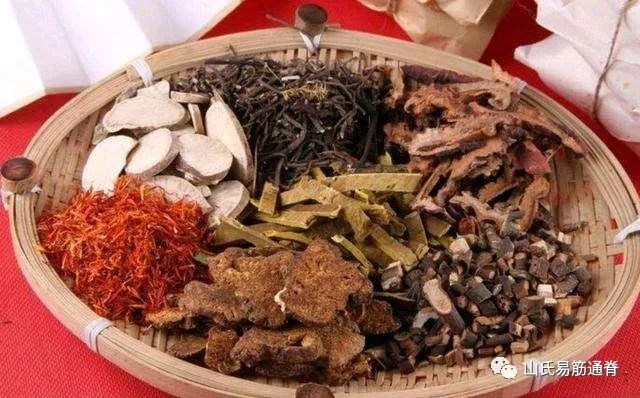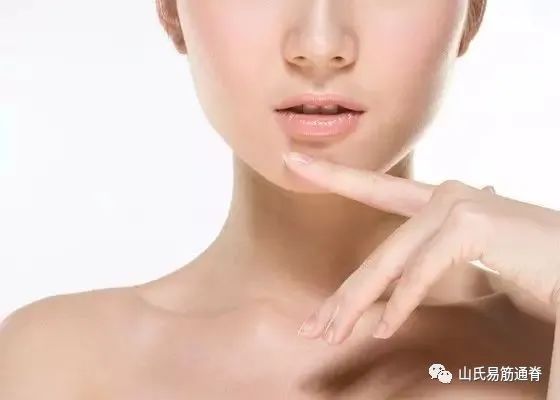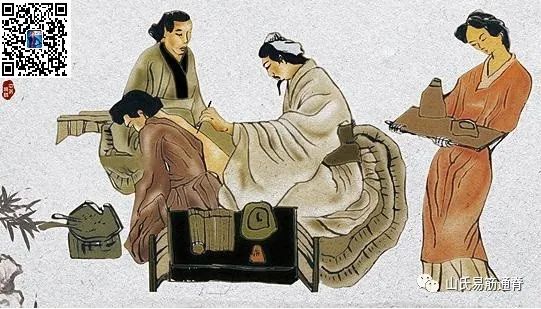Blood deficiency refers to the insufficiency of blood, leading to malnourishment of the organs, meridians, and body, characterized by pale or sallow complexion, pale lips, tongue, and nails, dizziness, palpitations, vivid dreams, numbness in hands and feet, and in women, scanty menstrual flow with pale color, delayed menstruation, or amenorrhea, with a thin pulse being common symptoms.
Etiology and Pathogenesis
This condition is often caused by improper diet, excessive labor, emotional distress, excessive blood loss, prolonged illness, or inherent weakness.
Clinical Manifestations
Pale or sallow complexion, pale lips, tongue, and nails, dizziness, palpitations, vivid dreams, numbness in hands and feet, scanty menstrual flow in women with pale color, delayed menstruation, or amenorrhea, and a thin pulse are common symptoms.

Diagnosis and Treatment
1. Palpitations with Blood Deficiency
Symptoms: Palpitations, dizziness, insomnia with vivid dreams, pale complexion, fatigue, pale red tongue, thin weak pulse. Treatment principle: Nourish blood, calm the heart, tonify qi, and calm the spirit. Main formula: Gui Pi Tang (Restore the Spleen Decoction). Ingredients: Bai Zhu (White Atractylodes), Dang Gui (Angelica Sinensis), Bai Fu Ling (White Poria), Huang Qi (Astragalus) (stir-fried), Yuan Zhi (Polygala), Long Yan Rou (Longan), Suan Zao Ren (Sour Jujube Seed) (stir-fried), Dang Shen (Codonopsis), Mu Xiang (Aucklandia), Gan Cao (Licorice) (stir-fried), Sheng Jiang (Fresh Ginger), Da Zao (Jujube).
2. Deficiency-Related Fatigue with Blood Deficiency
Clinical manifestations primarily feature symptoms of heart and liver blood deficiency.
(1) Heart Blood Deficiency: Symptoms include palpitations, forgetfulness, insomnia with vivid dreams, pale complexion, pale tongue, thin or irregular pulse. Treatment principle: Nourish blood and calm the spirit. Main formula: Yang Xin Tang (Nourishing the Heart Decoction). Ingredients: Dang Gui, Sheng Di Huang (Raw Rehmannia), Shu Di Huang (Prepared Rehmannia), Dang Shen, Mai Men Dong (Ophiopogon), Wu Wei Zi (Schisandra), Zhi Gan Cao (Honey-fried Licorice), Bai Zi Ren (Biota Seed), Fu Shen (Poria), Deng Xin Cao (Juncus), Lian Zi (Lotus Seed).
(2) Liver Blood Deficiency: Symptoms include dizziness, vertigo, tinnitus, hypochondriac pain, restlessness, irregular menstruation, amenorrhea, and in severe cases, brittle nails, pale complexion, pale tongue, and thin wiry pulse. Treatment principle: Nourish blood and support the liver. Main formula: Si Wu Tang (Four Substance Decoction) with modifications. Ingredients: Dang Gui, Shu Di Huang, Bai Shao (White Peony), Chuan Xiong (Chuanxiong).
3. Dizziness with Blood Deficiency
Symptoms: Dizziness and vertigo, worsening with movement, exacerbated by exertion, pale complexion, pale lips and nails, often accompanied by fatigue, shortness of breath, palpitations, and insomnia. Treatment principle: Nourish blood, calm the heart, tonify qi, and calm the spirit. Main formula: Gui Pi Tang. Ingredients: Bai Zhu, Dang Gui, Bai Fu Ling, Huang Qi (stir-fried), Yuan Zhi, Long Yan Rou, Suan Zao Ren (stir-fried), Dang Shen, Mu Xiang, Gan Cao (stir-fried), Sheng Jiang, Da Zao.
4. Headache with Blood Deficiency
Symptoms: Headache and dizziness, dull pain, worsens with exertion, pale complexion, palpitations, fatigue, poor appetite. Treatment principle: Nourish and tonify qi and blood. Main formula: Ba Zhen Tang (Eight Treasure Decoction). Ingredients: Shen Ren Shen (Ginseng), Bai Fu Ling, Bai Zhu, Zhi Gan Cao, Shu Di Huang, Dang Gui, Bai Shao, Chuan Xiong.
5. Constipation with Blood Deficiency
Symptoms: Dry and hard stools, difficulty in passing, fatigue, pale complexion, dizziness, palpitations, pale lips, thin pulse. Treatment principle: Nourish blood, moisten the intestines, and relieve constipation. Main formula: Run Chang Wan (Moisten the Intestines Pill). Ingredients: Dang Gui, Sheng Di Huang, Tao Ren (Peach Kernel), Huo Ma Ren (Hemp Seed), Zhi Qiao (Bitter Orange).
6. Hemorrhagic Disorders with Blood Deficiency
Symptoms: Nosebleeds, or accompanied by gum bleeding, skin bleeding, fatigue, pale complexion, dizziness, tinnitus, palpitations, thin and weak pulse. Treatment principle: Tonify qi and stabilize blood. Main formula: Ren Shen Gui Pi Tang (Ginseng Restore the Spleen Decoction). Ingredients: Huang Qi (stir-fried), Bai Zhu, Dang Gui, Bai Fu Ling, Yuan Zhi, Long Yan Rou, Suan Zao Ren (stir-fried), Shen Ren Shen, Mu Xiang, Gan Cao (stir-fried), Sheng Jiang, Da Zao.
7. Febrile Diseases with Blood Deficiency
Symptoms: Fever, worse at night and better during the day, palpitations, fatigue, pale complexion, pale tongue, thin and rapid pulse. Treatment principle: Clear heat and nourish blood. Main formula: Dang Gui Bu Xue Tang (Angelica Blood Nourishing Decoction). Ingredients: Dang Gui, Huang Qi.

Blood circulates through the meridians, supplying nutrients to the five organs, carrying waste out through the lungs and kidneys, and nourishing the organs. Common issues with blood include: First, blood deficiency, similar to what Western medicine refers to as anemia, where there is a lack of albumin and basic cellular material, primarily due to insufficient hemoglobin carrying nutrients. Second, blood stasis, where qi stagnation obstructs blood flow. Third, blood dryness, where there is an excess of nutrients leading to a state of excess. Fourth, organ issues such as liver yin deficiency, where the liver cannot store blood properly, leading to blood overflowing outside the liver, causing erratic blood flow.Blood dryness requires clearing heat and cooling the blood, while blood stasis requires soothing the liver and regulating qi to ensure smooth blood flow. Liver yin deficiency cannot nourish the liver, thus requiring yin tonification and blood nourishment. Only blood deficiency, akin to anemia, requires blood tonification.The circulation of blood is related to the liver, heart, spleen, lungs, and kidneys. The spleen governs blood, meaning blood relies on qi for movement and collection, as qi is the commander of blood, and the spleen generates qi. The spleen also produces blood, containing the basic materials for blood production, similar to what is now referred to as hematopoietic stem cells. The liver is responsible for storing blood, filtering blood, and detoxifying. The heart’s relationship with blood quality is minimal, primarily pumping blood throughout the body. The kidneys transform essence into blood, while the lungs are mainly responsible for the exchange of oxygen in red blood cells. To determine which organ is causing blood issues, one must differentiate the patterns. Nowadays, anemia due to malnutrition is rare; most cases are due to excess nutrition leading to blood dryness and high blood lipids, liver and kidney yin deficiency, and qi stagnation leading to blood stasis, which can cause liver cirrhosis. Therefore, accurate differentiation is essential, and one should not blindly tonify blood but rather adjust blood nourishment according to individual conditions. Thus, it is more accurate to say “nourish blood” rather than just “tonify blood,” which is more suitable for modern individuals.Nourishing blood should primarily focus on the traditional classic formula—Si Wu Tang (Four Substance Decoction), consisting of Dang Gui, Huang Qi, Bai Shao, and Shu Di Huang. Dang Gui and Chuan Xiong are slightly warming, Bai Shao is cooling, and Shu Di Huang nourishes yin and cools down, calming the body. If there is blood dryness and heat, Bai Shao should be used more; if there is qi stagnation and blood stasis, Chuan Xiong should be emphasized for invigorating blood flow; if there is liver yin deficiency, Shu Di Huang should be emphasized for nourishing yin; if there is anemia, Dang Gui should be emphasized.Here, we mainly discuss blood deficiency, which generally results from poor coordination and balance between organs, insufficient blood cells, and malnutrition. Long-term blood deficiency can lead to anemia and various unexpected severe consequences, as blood supplies nutrients to all organs and tissues.Blood deficiency first manifests as a pale and dull complexion, pale tongue, and a dry, lackluster appearance.Secondly, it manifests as brittle nails, as the liver governs blood storage and circulation, and the nails are the residuals of the tendons. Brittle nails and easy breakage indicate that blood is not nourishing the tendons.It also presents as dizziness and lightheadedness, as insufficient blood supply to the head leads to dizziness, which should be distinguished from headaches, as headaches are a manifestation of excess. Dizziness can also be due to blood rising to the head, which is also a manifestation of excess. Blurred vision indicates that blood is not nourishing the eyes, leading to dryness.Palpitations are also due to insufficient blood supply to the heart, where yin blood cannot nourish the heart, and numbness in hands and feet indicates that blood supply does not reach the extremities. In TCM, there is a professional term—”numbness and insensitivity,” where numbness indicates insufficient blood supply, a sensation of blood deficiency. Palpitations indicate insufficient nourishment of the heart vessels, leading to a feeling of numbness. Insensitivity indicates a lack of sensation, a state of severe qi and blood deficiency.Vivid dreams and fatigue— the liver is a sponge-like organ, and forgetfulness and vivid dreams are manifestations of liver yin deficiency, where blood does not return to the liver, causing erratic blood flow. The liver is the sea of blood storage, and qi stagnation, excessive drinking, fatty liver, and high fat can obstruct blood circulation, leading to erratic blood flow, causing vivid dreams.Additionally, liver yin deficiency, where blood does not return to the liver, leads to scanty menstruation due to insufficient blood storage, amenorrhea, all of which are symptoms of blood deficiency. Blood deficiency can generate wind, leading to liver qi stagnation, blood stasis, insufficient qi and blood, and wind symptoms. Blood stasis and high blood lipids are all symptoms of heat generated by blood deficiency.
Health Maintenance Tips
1. Maintain a cheerful disposition and an open personality, which not only enhances the body’s immune system but also promotes physical and mental health, while stimulating the hematopoietic function in the bone marrow, resulting in a rosy complexion. Therefore, one should frequently maintain an optimistic mood.
2. Ensure adequate sleep and abundant energy and physical strength, maintaining regular daily routines, moderate entertainment, and a balance between work and rest. Learn to live scientifically, adopting a modern healthy lifestyle: avoid staying up late, avoid picky eating, avoid snacks, quit smoking and limit alcohol, and refrain from sexual activity during special physiological periods such as menstruation or postpartum.
3. Regular participation in physical exercise is essential, especially for women who have given birth, who should engage in appropriate physical activities and outdoor exercises for at least half an hour daily, such as aerobics, running, walking, playing sports, swimming, or dancing, to enhance physical strength and hematopoietic function.


